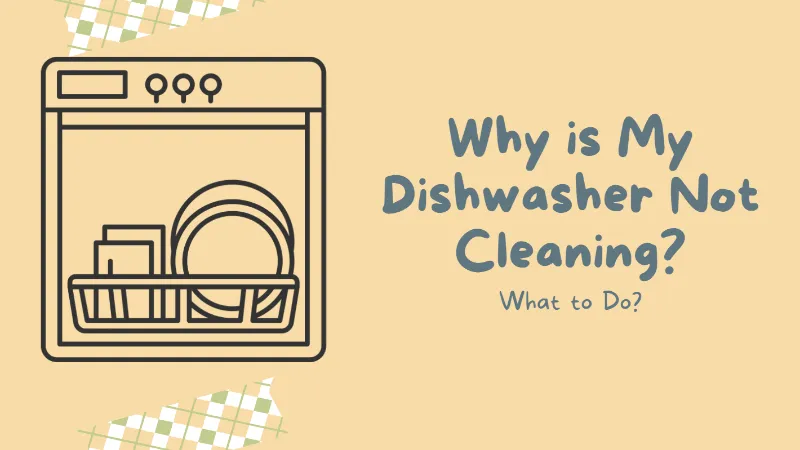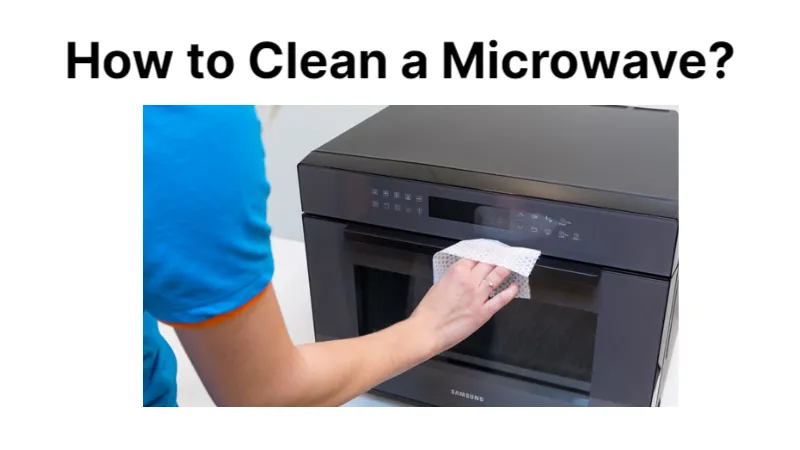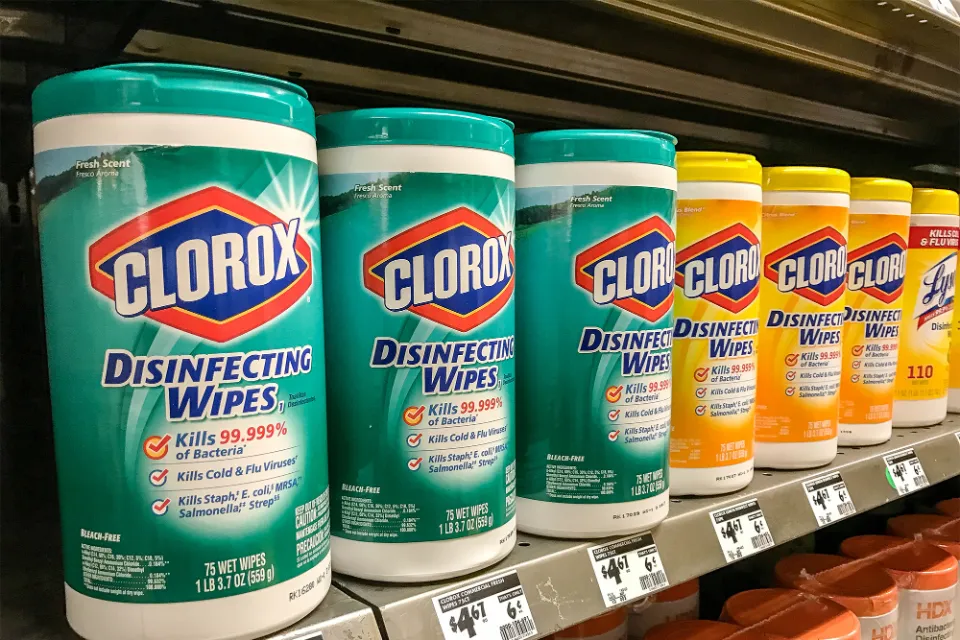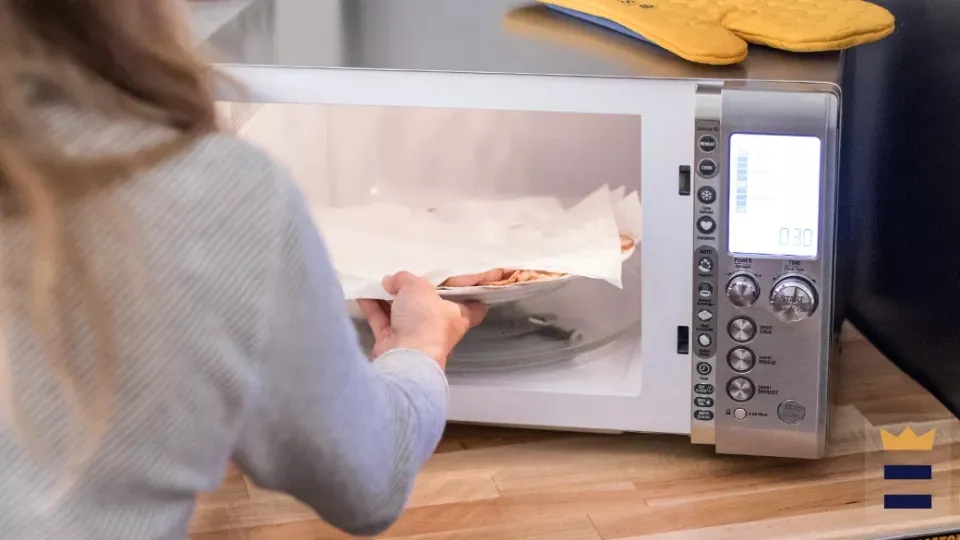To begin with, why is my dishwasher not cleaning? Your dishwasher may not be cleaning as well as it should for a number of reasons, such as a dirty filter, the wrong detergent, improper loading, or the incorrect cycle or water temperature…
To learn more about typical dishwasher issues and solutions, read this guide. You’ll soon be back to controlling your post-meal messes.
Why is My Dishwasher Not Cleaning?
There are a few reasons why your dishwasher might not be cleaning effectively:
Dirty Or Clogged Filter
Does your dishwasher leave behind food stains or make your dishes feel scratchy? A clogged or dirty filter may be the root of the problem. The best performance of the dishwasher is maintained by routine filter cleaning. Your dishwasher’s bottom center is where the filters are located. Over time dishwasher filters can get clogged from regular use, and cleaning the dishwasher filter is a simple fix that will get your dishwasher back to its normal cleaning power.
Broken Soap Dispenser
Detergent may not reach your dishes if your soap dispenser isn’t functioning properly, or it may not release when it should during the wash cycle. A spring in the dispenser door becoming stuck is a frequent problem. To clean the soap dispenser and springs, try using a small brush. Grease and debris can be removed with the aid of a hot water and vinegar solution. A replacement must be made if the dispenser door or spring are damaged. Last but not least, inspect the gasket around the dispenser and replace it if necessary. The gasket’s lifespan might be increased by occasionally applying a tiny dab of petroleum jelly to it.
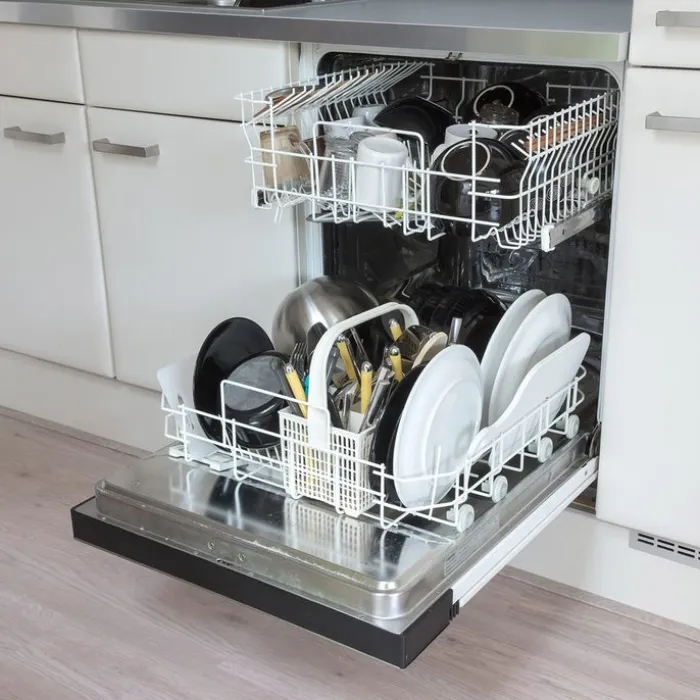
Rinse before Loading
Once your dishwasher is cleaning well once more, take a few quick steps to maintain it. Keep in mind that a dishwasher is not a garbage disposal first. Many of today’s newer models (if labeled “self-cleaning”) contain macerators, which are similar to garbage disposals but are only designed to handle tiny bits of soft food. The small macerator may become overloaded if dishes or pans with large or hard food deposits are placed in the dishwasher, leaving stains on plates and glasses. The best procedure is to scrape off any leftover food before rinsing dishes in hot water to get rid of any large chunks before loading.
Clogged Spray Arm
Dishwasher spray arms rotate beneath or above the racks, shooting water to wash the dishes. Spray arms’ jets, which are essentially tiny holes, are prone to clogging, which lowers water pressure. It might be more effective to clean the spray arms. Depending on your model, you may only need to unscrew one screw to remove the arm for cleaning. Use a toothpick to remove clogs from the holes after cleaning it with a soft brush and dish soap. Then, give it a thorough hot water rinse.
Nobody would be critical of you if you assumed that a dishwasher uses a sizable amount of water for each load. After all, one of the largest appliances in your home is usually this one. You may have wondered how much water does a dishwasher use.
Incorrect Dishwasher Detergent
Your dishwasher should only be used with automatic dishwasher detergents. Instead of powder, liquid, or gel detergents, use premeasured dishwasher detergent tablets and pacs to help reduce film on your dishes. Using tablets and pacs, such as these from affresh®, can help reduce or eliminate white film on your dishes over time.
Improper Loading
Inadequate loading of the dishwasher could be the cause of your dishwasher’s failure to thoroughly clean your dishes. The spray arms might not be able to reach your dishes effectively if the dishwasher is not loaded properly. The water may get blocked by dishes that are stacked on top of one another or that are not arranged at an angle, which will result in inadequate cleaning. Loading the dishwasher correctly might be the easy fix you need to see better results.
Wrong Cycle
A longer cycle in the dishwasher might be necessary to thoroughly clean dishes that are heavily soiled. In the event that your dishwasher has an automatic cycle, it will detect any soil on the dishes and adjust the cycle. If you think your dishes might require extra care, a high temperature cycle would also be helpful.
Low Water Temperature
The majority of dishwasher cycles need water that is at least 120 degrees Fahrenheit in order to operate properly. If your model doesn’t have a built-in heat-boosting mechanism, make sure your water heater is set to 120 degrees. (Any temperature setting above 120 degrees puts the user at risk of scalding, so use caution.) In order to ensure that hot water enters the dishwasher at the beginning, you can lastly run the kitchen faucet for 30 to 60 seconds before starting it. Suggested reading: How long do dishwashers last? This guide will tell you how to prolong the life of your dishwasher and keep it in good working condition.
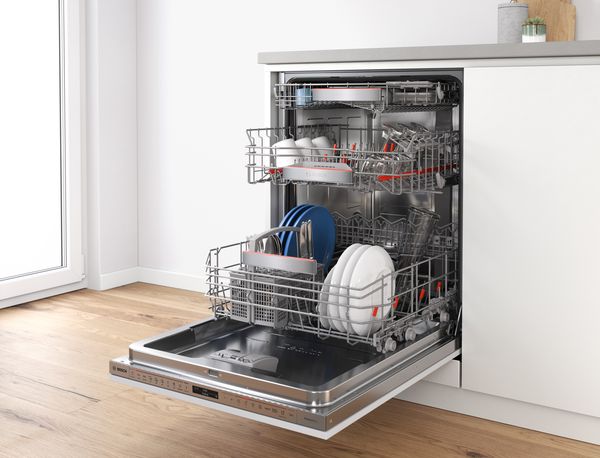
Incorrect Water Temperature
When water first enters the dishwasher, it should be around 120°F for best results. The dishwashing detergent is dissolved and activated by hot water. In addition to helping to dissolve grease on dishes, hot water can also help to prevent streaks on glasses.
You might discover that your dishwasher leaves residue if the water temperature is too low. Some food particles may be more difficult to remove and some detergent ingredients may not work if the water is too hot.
Replace the Dishwasher’s Inlet Valve
The inlet valve, which allows water to flow into the dishwasher, may be malfunctioning if the dishwasher is still not cleaning dishes after completing the aforementioned troubleshooting steps. The issue would be revealed by a hammering sound during the cycle. Many homeowners choose to hire a technician at this point, but if you prefer to do things yourself, consult your owner’s manual. It will include a list of the replacement valve you need to purchase and possibly instructions on how to swap out the current valve.
Tips for Dishwasher Not Clean
Here are the tips on how to solve when Dishwasher is Not Clean:
Use Vinegar to Clean and De-clog
You can frequently fix the issue by running a vinegar cycle if the gunk and goo buildup in your dishwasher—caused by food deposits and hard water—is minor. Simply choose the longest cycle and add three cups of white vinegar to the bottom of the empty dishwasher. The vinegar will clean the spray arm’s holes of debris and dissolve minor mineral buildup. Additionally, it will clean up leftover grease from the interior walls, making the dishes cleaner and smelling better.
Load Dishes as Recommended by the Manufacturer
No matter what type of dishwasher you own, properly loading it will yield the best results regardless of whether it has strong water jets or gentler ones. Inadequate loading of the dishwasher can prevent the spray from reaching all of the dishes, leading to food deposits that stick to the dishes.
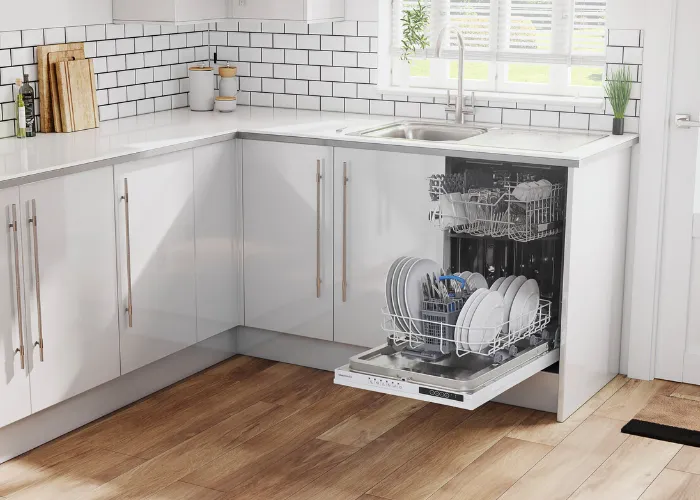
Add a Rinse Agent
Using a rinse agent can make the difference between cloudy, dull dishware and crystal-clear, glasses and shiny plates. Surfactants, which are present in these liquid additives, prevent water droplets from leaving stains. A small amount of rinse aid should be added to the bottom of the dishwasher before starting a load. Keep the rinse aid reservoir full.
Consider Installing a Water Softener
On plates and glassware, hard water can leave an unsightly residue. Additionally, it can leave stains on the dishwasher’s internal components, reducing the spray arm’s freedom of motion and blocking the valves, shortening the appliance’s lifespan. Perform a test with a straightforward kit if you suspect your water is hard. If test results reveal hard water, you might want to think about installing a water softener on the water line coming into your house. The softener will prevent hard water deposits from forming on sinks, tubs, and showers in addition to safeguarding your dishwasher.
Read about How Hot Does a Dishwasher Get?
Conclusion: Why is My Dishwasher Not Cleaning?
Your dishwasher may not be cleaning as well as it should for a number of reasons, including a dirty or clogged filter, broken soap dispenser, rinse before loading, clogged spray arm, incorrect dishwasher detergent, improper loading, wrong cycle, low water temperature, incorrect water temperature…
Thank you for reading.
